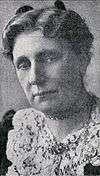Emma Gad
Emma Gad (January 21, 1852 - January 8, 1921), born Emma Halkier, was a Danish writer and socialite who wrote plays and books that were often satirical. Although she was a prolific writer, many of her works fell into obscurity after her death. One work that remained popular was Takt og Tone, a book of etiquette she wrote in old age.[1]
Emma Gad | |
|---|---|
 | |
| Born | Emma Halkier January 21, 1852 Copenhagen |
| Died | January 8, 1921 (aged 68) Copenhagen |
| Resting place | Cemetery of Holmen |
| Occupation | Writer |
| Language | Danish |
| Nationality | Danish |
| Spouse | Nicolas Urban Gad |
| Children | Peter Urban Gad, Henry Urban Gad |
She received a gold Medal of Merit in 1905. Today her plays are preserved in Denmark's Royal Library.
Biography
Gad grew up in a relatively affluent home in Copenhagen. Her father and uncle were the owners of the trading house G. Halkier & Co..[2] She received a good education for a woman at the time and married Nicolas Urban Gad, a rear admiral, in 1872. They had two sons: Henry and Peter Urban Gad, who later became a filmmaker. She was a member of many trade unions and women's societies in Copenhagen,[3] and her home was an important meeting place for intellectuals in Denmark at the turn of the century.[1]
In 1886 she premiered as a dramatist at the Royal Danish Theatre's Ny Scene. In the mid-1890s, she was the driving force behind the successful 1895 Copenhagen Women's Exhibition. In 1898 she co-founded the Women's Trade and Clerical Association, which was the first professional organization of women in the office.[4]
Etiquette - About Dealing with People
Gad's book Etiquette - About Dealing with People (Danish: Takt og Tone - Om Omgang med Mennesker) was published in 1918. Her oft-repeated point is that when visitation is between considerate people then "etiquette" is not necessary. It is the indifferent, selfish, or directly ruthless people that create the need for a formal etiquette.
Legacy and memorials
Emma Gads Vej, a street in Ørestad, Copenhagen, is named after her. On January 21, 2013, Google made a doodle for Emma Gad's 161st birthday, in honor of her book of etiquette.[5]
References
- Katharina Wilson (1991). An encyclopedia of continental women writers. 1. A - K. Garland Publishing, Incorporated. pp. 436–. ISBN 978-0-8240-8547-6. Retrieved 2 May 2013.
- "Emma Gad (1852 - 1921)". kvinfo.dk (in Danish). Retrieved 10 April 2020.
- Ethnologia Scandinavica. Royal Gustav Adolf Academy. 2003. Retrieved 2 May 2013.
- "Emma Gad (1852 - 1921)" (in Danish). Kvinfo. Retrieved 12 March 2018.
- "Emma Gad's 161th Birthday". www.google.com. Retrieved 2019-05-25.
External links
- Works by Emma Gad at LibriVox (public domain audiobooks)
